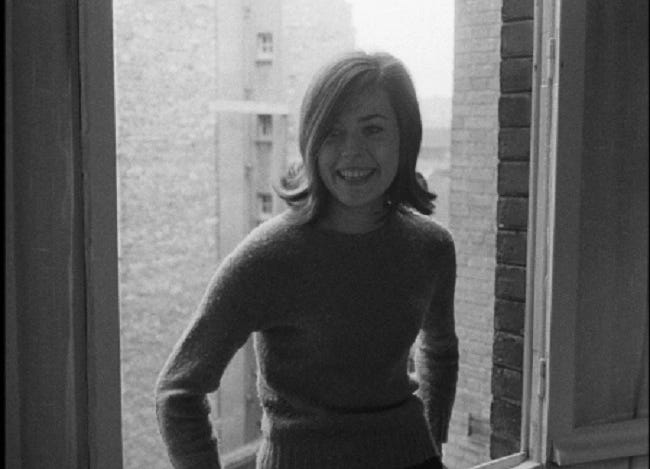This article was originally translated as part of Lucky Star’s profile of Alejo Moguillansky but we ultimately decided against using it. Now I publish it here.
On Masculin Féminin
By Alejo Moguillansky
Unlike Juan Villegas, who hadn’t seen Masculin Féminin since 1995, this Godard film, filmed in 1965 and released in 1966, was always a center of gravity for me, which I have tried time and time again to orbit.
A definition of that film could be simplified: a somewhat idealistic student, called to militancy, falls in love with a rising pop singer in Paris in the mid 60’s. One of the many intertitles at some point explains them: “this film could be called The Children of Marx and Coca-Cola.” Or better yet, as a slogan read on its original poster: “sex and youth in today’s France.”
There is something evident about it, and it makes it one of the most difficult films to classify or locate it in Godard’s filmography: its factor of being a generational portrait. Because beyond the obvious contrast of two conflicting discourses in the characters of Léaud (the student) and Chantal Goya (the singer), there is a cinematographic form that runs through the entire film, generating several of its narrative jabs. It is the form of the interview.
There are several interviews within the film: the long scene in the bathroom where two interviews are staged, as if they were reverse shots (the anecdote of Godard whispering questions in the interviewer’s ear, out of frame, is famous) but also the interview with a common girl (without the disguise of a possible dialogue) that the film decides to give the title: “Dialogue with a Consumer Product.” Somehow Masculin Féminin is a study about the interview in cinema. It’s obvious, but it must be said: it is not an innocent gesture of the narrative that the character of Jean-Pierre Léaud earns a living by taking surveys.
There is something that Léaud says in the voiceover, during a passage of the film intended to ellipse three months of the story with daytime and nighttime passages of Paris, Léaud walking like Keaton in the crowd: “I came to realize that these questions did not reflect, but deformed the collective mentality. My lack of objectivity, even when unconscious, tended to provoke a predictable lack of sincerity in those I was polling. Unawares, I was deceiving them and being deceived by them. Why? Probably because polls and surveys quickly veer from their true goal, the observation of behavior… I discovered that the questions I would ask expressed an ideology that does not reflect the present, but the past.”
What do we see then when we film an interview? When we use it, even in full view of others, as a possible dialogue of the story? I myself have abused it in my filmmaking attempts. It would be the most flagrant case of a Godardian inversion that could be pronounced as “a lie 24-frames-per-second.” And yet there is always a documentary background capable of revealing the reverse of each image. There will always exist that range that Léaud’s character called behavior, and it is found in the field of the unspeakable, of a type of fiction that is difficult to imagine because it comes precisely from the heart of the real, and belongs to the field of the imaginary. Somehow it is not so distant from what Bresson intended: it’s not Joan of Arc, it’s Florence Delay saying the texts of Joan of Arc. And even in that simulacrum Florence Delay has never been filmed so nakedly, so struck down by a point of view that goes through her, and recovers her to the world of film. The portrait produced by Masculin Féminin certainly has an anthropological spirit. What Godard tries to film is the political use of the language of the characters, the resistance to cliches, the incapacities of what is spoken, the common everyday places seen anew, the limit of the literal use of language. Somehow it is one of the most powerful ways to portray a generation politically: film them, from the past all the way to the present, lying.
Originally published in Spanish in Revista de Cine Web (8/23/2020). Translation by Jhon Hernandez. Thanks to Diego with help with the translation.
Discussion about this post
No posts





